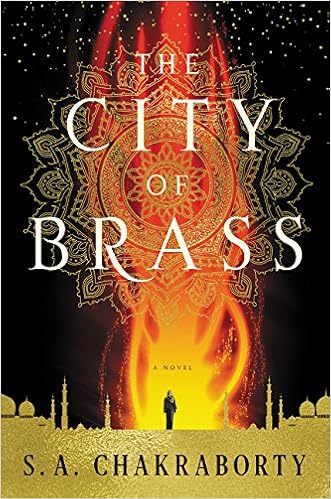Nahri is a young, street smart con artist living in Cairo. The Ottoman and French Empires are contesting the land, meaning that there are all sorts of marks for her fortune telling business.
But Nahri has other skills, too. She has a knack for healing the sick. If she hears any language, she can understand and speak it. Her own native tongue, Divasti, is completely different from anything else others speak.
While participating in a Zar exorcism ceremony, Nahri decides to use Divasti to add some exotic flair. Little does she know that it will get the attention of a daeva and a ifrit. Plunged into a world that she previously thought was myth, Nahri has to navigate her place in the new world.
Overall, this was a fun book to read. I've had it near the top of my queue since April, but felt the time was right just a few weeks ago. I took it with me to a major convention, PAX Unplugged. I found the story engaging enough that I was stealing time before gaming sessions to enjoy it! It certainly made standing in the registration lines a lot more bearable.
Nahri is a well-rounded character, as are the supporting cast. But the setting is definitely the highlight of the book. It's fun to read a story that takes its cues from Islamic culture. Chakraborty does a great job of making the world details come to life. Because the general public lacks a lot of knowledge, the book has to do a lot of world-building, so the pacing can be a bit slower at times. But for seasoned fantasy readers, that's not an impediment. Many would see it as a feature rather than a bug. For those looking for more consolidated detail, there is a glossary at the back of the book.
If I were to compare City of Brass to another book, the choice that comes to mind is Harry Potter and the Sorcerer's Stone. Nahri and Harry share some interesting parallels. They're both young, destitute people with special abilities. They're both orphans, and they both have an unlikely mentor (although Hagrid and Dara have very different personalities). The similarities are superficial, granted, but there's enough parallels that it really piqued my interest.
Honestly, I think that's a sign that S.A. Chakraborty was trying to grow her writing chops. City of Brass is a debut novel, and a rather ambitious one at that. Plotting isn't an easy task to learn, so keeping the plot familiar acts as training wheels while the author is learning. If the plot were at the same level for further volumes, I'd grade harder.
As it is, though, City of Brass is an entertaining read with a vivid setting and solid plot. The characters are fairly likeable overall, with solid motivations and intentions. I'm really looking forward to the next book of the series, The Kingdom of Copper. That'll be released next January.



